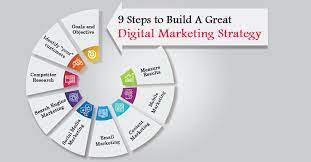The Power of Online Content Marketing Services
In today’s digital age, online content marketing has become a crucial strategy for businesses looking to engage with their target audience, build brand awareness, and drive conversions. With the vast amount of information available online, it is essential for companies to create high-quality and relevant content that resonates with their customers.
What are Online Content Marketing Services?
Online content marketing services encompass a range of strategies aimed at creating and distributing valuable content to attract and retain a clearly defined audience. These services may include:
- Content Strategy: Developing a comprehensive plan to align content creation with business goals and target audience needs.
- Content Creation: Producing engaging and informative articles, blog posts, videos, infographics, and more to capture the audience’s interest.
- Content Distribution: Promoting content across various online channels such as social media, email marketing, and search engines to reach a wider audience.
- Content Analytics: Monitoring and analysing the performance of content campaigns to measure success and make data-driven decisions for future strategies.
The Benefits of Online Content Marketing Services
Effective online content marketing services offer numerous benefits for businesses:
- Increased Brand Visibility: By consistently producing valuable content, businesses can enhance their online presence and attract more potential customers.
- Improved Customer Engagement: Quality content helps build trust with customers and encourages them to interact with the brand through likes, shares, comments, and more.
- Enhanced SEO Performance: Well-optimised content can improve search engine rankings and drive organic traffic to the website.
- Higher Conversion Rates: Relevant and compelling content can influence buying decisions and convert leads into customers.
In Conclusion
In conclusion, online content marketing services play a vital role in helping businesses connect with their target audience in the digital landscape. By investing in quality content creation, distribution, and analysis, companies can establish themselves as industry leaders and drive meaningful engagement with their customers.
9 Essential Tips for Mastering Online Content Marketing Services
- Understand your target audience and their needs.
- Create high-quality, engaging content that provides value.
- Use SEO techniques to improve visibility in search engines.
- Utilise social media platforms to promote your content.
- Collaborate with influencers or other brands for wider reach.
- Analyse data and track performance to make informed decisions.
- Stay updated on industry trends and adapt your strategy accordingly.
- Encourage user interaction through comments, shares, and likes.
- Provide a clear call-to-action to guide users towards desired outcomes.
Understand your target audience and their needs.
To succeed in online content marketing services, it is crucial to thoroughly understand your target audience and their specific needs. By conducting thorough research and analysis, businesses can tailor their content to resonate with their audience, address their pain points, and provide valuable solutions. This deep understanding allows companies to create engaging and relevant content that not only attracts the right audience but also builds trust and fosters long-lasting relationships with customers. By putting the audience at the forefront of content creation strategies, businesses can effectively drive engagement, conversions, and brand loyalty in the competitive digital landscape.
Create high-quality, engaging content that provides value.
To succeed in online content marketing services, it is essential to focus on creating high-quality, engaging content that offers genuine value to the target audience. By producing content that is informative, entertaining, and relevant to the audience’s needs and interests, businesses can establish credibility, build trust with their customers, and drive meaningful engagement. Quality content not only attracts and retains the audience’s attention but also positions the brand as a valuable resource in its industry, ultimately leading to increased brand visibility and customer loyalty.
Use SEO techniques to improve visibility in search engines.
Utilising SEO techniques is essential for enhancing visibility in search engines as part of effective online content marketing services. By implementing strategies such as keyword research, on-page optimisation, and link building, businesses can improve their website’s ranking in search results and attract more organic traffic. SEO not only helps increase brand visibility but also ensures that the content reaches the right audience at the right time, ultimately driving conversions and achieving business goals.
Utilise social media platforms to promote your content.
To maximise the reach and impact of your online content marketing efforts, it is essential to leverage social media platforms as powerful promotional tools. By strategically sharing your content across platforms such as Facebook, Twitter, Instagram, and LinkedIn, you can engage with a wider audience, drive traffic to your website, and foster meaningful interactions with potential customers. Social media enables you to amplify the visibility of your content, increase brand awareness, and ultimately enhance your overall digital marketing strategy.
Collaborate with influencers or other brands for wider reach.
Collaborating with influencers or other brands can significantly expand the reach of your online content marketing efforts. By partnering with individuals or businesses that have a strong following or influence in your industry, you can tap into their audience and leverage their credibility to increase brand visibility and engagement. This collaborative approach not only helps you reach a wider demographic but also allows you to benefit from the unique perspectives and expertise of your partners, ultimately enhancing the effectiveness of your content marketing strategy.
Analyse data and track performance to make informed decisions.
Analysing data and tracking performance are essential components of effective online content marketing services. By monitoring key metrics such as engagement rates, conversion rates, and website traffic, businesses can gain valuable insights into the effectiveness of their content strategies. This data-driven approach allows companies to identify what is working well and what areas need improvement, enabling them to make informed decisions to optimise their content and achieve better results.
Stay updated on industry trends and adapt your strategy accordingly.
To succeed in online content marketing services, it is essential to stay informed about the latest industry trends and adapt your strategy accordingly. By keeping a close eye on emerging technologies, consumer preferences, and market dynamics, businesses can ensure that their content remains relevant and engaging. Adapting your strategy in response to industry trends not only demonstrates your flexibility but also positions your brand as a forward-thinking authority in the digital space. Embracing change and innovation can lead to increased audience engagement and long-term success in the competitive online landscape.
Encourage user interaction through comments, shares, and likes.
To enhance the effectiveness of online content marketing services, it is essential to encourage user interaction through comments, shares, and likes. By fostering engagement with the audience, businesses can build a sense of community around their content, strengthen relationships with customers, and increase brand visibility. User-generated interactions not only indicate interest and satisfaction but also contribute to organic reach and virality, amplifying the impact of the content across digital platforms.
Provide a clear call-to-action to guide users towards desired outcomes.
In the realm of online content marketing services, a valuable tip is to always provide a clear call-to-action that guides users towards desired outcomes. By incorporating a compelling and easily identifiable call-to-action in your content, such as “Sign up for our newsletter” or “Shop now,” you can prompt users to take the next step in their customer journey. This strategic approach not only enhances user engagement but also increases the likelihood of conversions, ultimately driving the desired results for your business.



